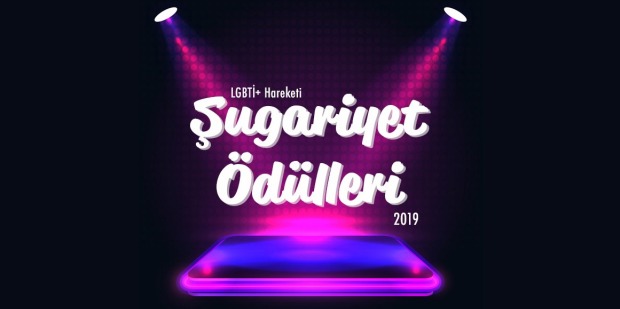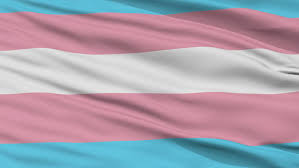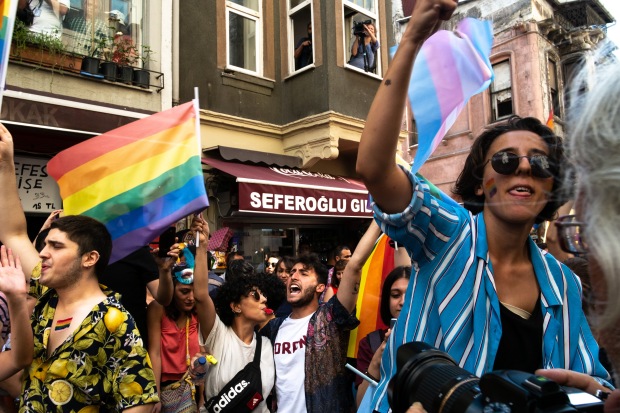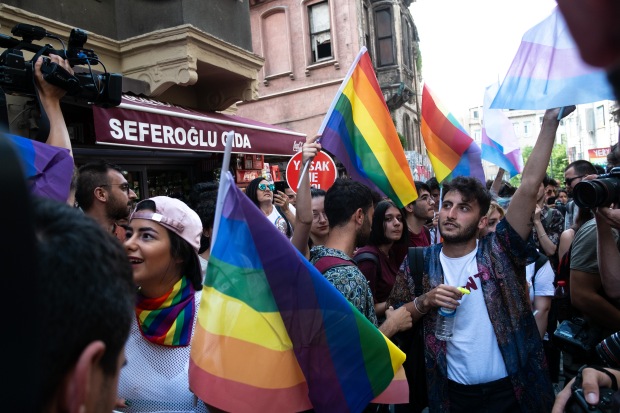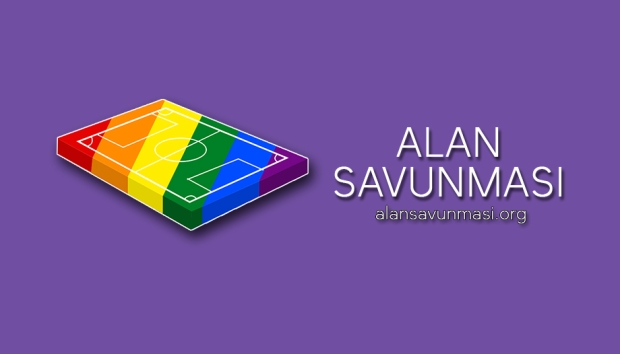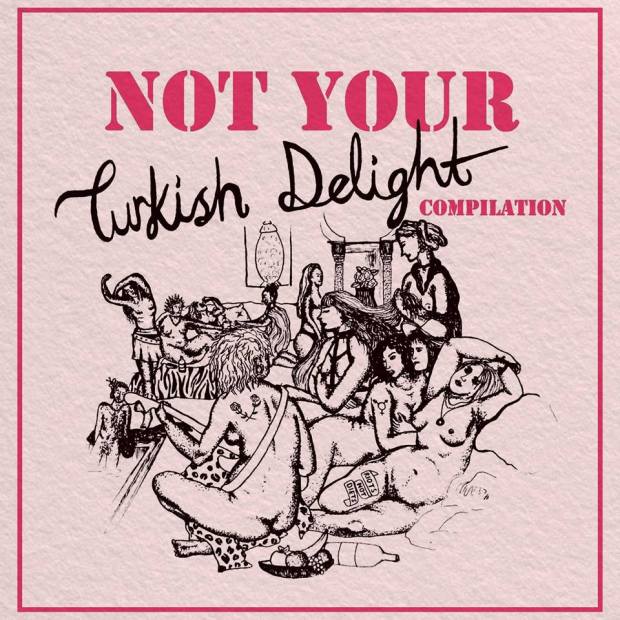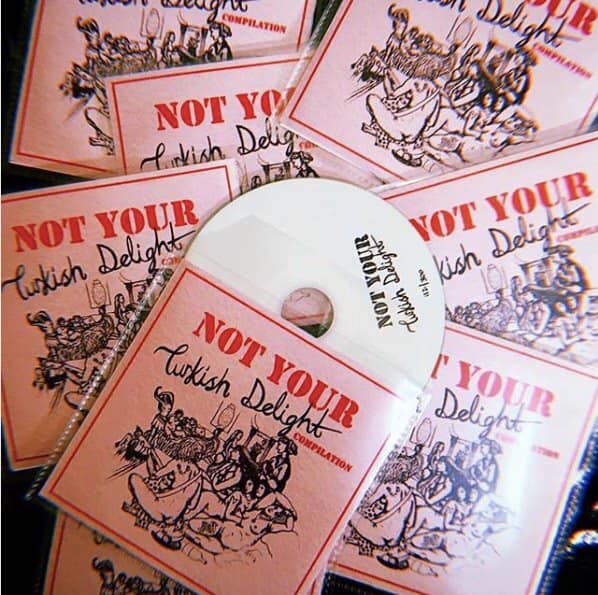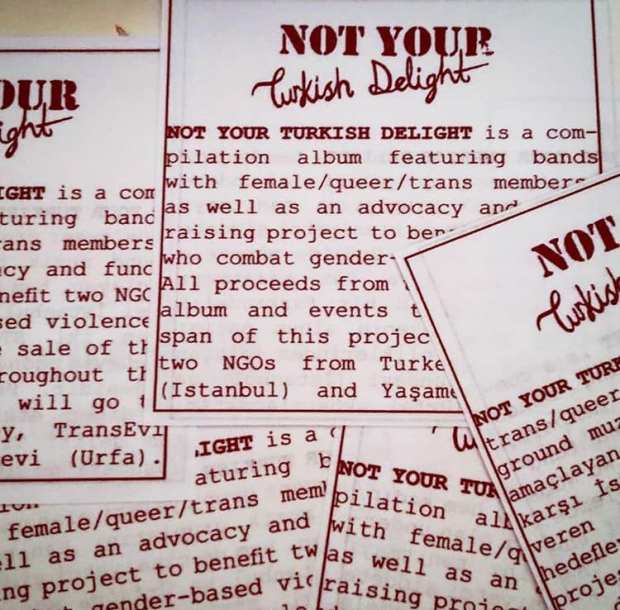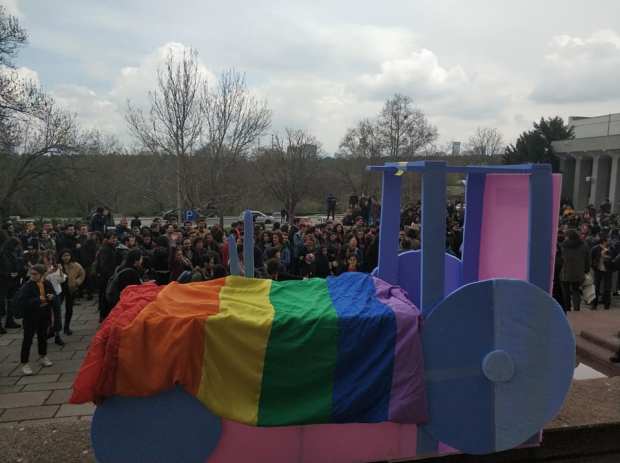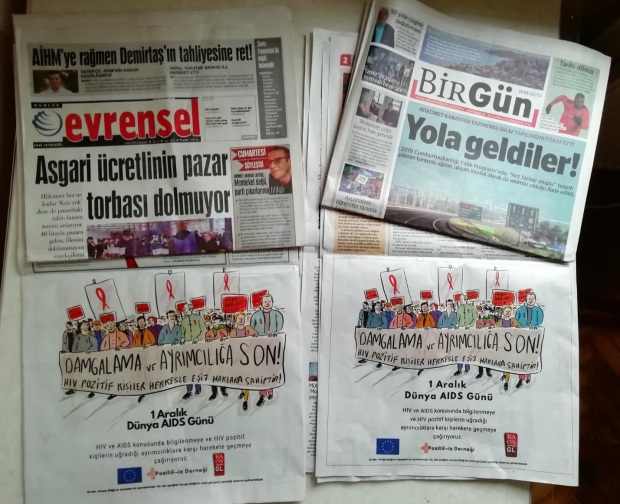Bitopya is a new platform founded by Umut Erdem. Umut has been writing about monosexism, normativity and bisexuality in contributions to the bi+, vegan and feminist struggles. In this interview, we walk together on the path to Bitopya (bitopia): The invisibility of bi+ existence, the pressing necessity for accesible and correct information on bisexuality in order to get rid of the stereotypes that reign over both the LGBTI+ movement and the heteronormative society , different layers of rescuing sexuality from the hegemony of norms…these are all the stations we will stop by. As LGBTI News Turkey we are excited to follow Bitopya in its journey and would like to thank Umut for taking their time for this interview!
First of all, we would like to get to know you and the crew.
My name is umut erdem (they/them). I’m the founder of Bitopya ☺. I have been actively pursuing bi+politics for a long while. I have been producing content on this subject and in 2019 I became one of the organizers of Bi+ Pride İstanbul which was the first of its kind to take place in Istanbul. We realized the Bi+ Pride together with dear Zeynab Peyghamberzadeh, another bi+ activist. I also organized a Bi+ Visibility Workshop during Pride Week in İzmir last year. In 2018, I prepared a Bi+ pamphlet together with Gözde Demirbilek, under Kaos GL’s roof.
I live in Istanbul, I earn my living working in a private institution. I am a feminist and a vegan, I also do activism in these fields. Bitopya itself is a field of activism for me. The website was realized thanks to transfeminist activist Ecemen who helped me build the site. Ecemen had also created the website lgbtisagligi.org. This gave us the opportunity to work together. For now, I’m translating the texts about bi+ politics and bi+ healthcare, the ones which I read before and thought “these must definitely be translated to Turkish”. Yet I also need other pairs of eyes to check the translations and to contribute. I can’t really call it a crew but there are definitely collaborations. My friends with whom I exchange ideas and talk about bisexuality and bi+ politics have an important role in the creation of Bitopya.
Umut, your name will definitely ring a bell for our readers from Turkey, how did you come up with the idea to build the website?
The idea of the website was mine. I personally really needed a true bi+ digital platform. This was my main motivation to realize it. Bisexuality is already an easily erased, invisible position, furthermore, both the lgbti+ and the feminist politics regard it as an intersection rather than an entity of its own. On social media, bisexuality is often targeted and there are many negative, judgemental and biased content, even hate speech about bisexuality. Therefore, I imagined a universe where we can respond to all of this.
The need to increase the visibility of bi+ politics in Turkey was also a great motivation. I applied to sivildüşün and their support helped me realize the project. Since I know English, I aim to put bi+ people in the agenda of lgbti+ and feminist politics by translating articles about the bi+ politics and bisexual health published abroad. I thought that it would be a big step forward to create a source of information to battle against both the invisibility and the bias, stereotypes, hate speech and dire lack of information about the bi+. I can say Bitopya was born out of the passion to create a universe where we can try to oust monosexism and biphobia out of our lives, ways of thinking and acting; just like we have been struggling against discrimination, patriarchy, and heteronormativity.☺
As its name aptly expresses, bitopya carries the aim to expand the horizons through new imaginings for bi+. What do you think is the work and role of digital activism?
It is surely not just tweeting ☺. It doesn’t matter how much that tweet is faved or retweeted. I find the power of social media significant, but I doubt that one tweet or one long flood of political discourse are digital activism. My questioning of the scope of digital activism pushed me to create the website. In my opinion, digital activism should carry the aim to counter the disinformation on social media and promote a healthy platform for debate, dialogue and contact. I’m also motivated to do digital activism for bi+ politics resisting hate speech against the bi+ people. I see so many biphobia ridden tweets written by users who would not accept their biphobia. I am trying to make the digital media a safer place for bi+ people, against monosexism and biphobia. This is what digital activism means for me as well. It is to carry out work of awareness-building without creating opposite poles, without siding with violence; caring for information exchange, healthy communication, equality and inclusion instead.
How is the “B” and the “+” faring in the LGBTI+ movement of Turkey? How would you describe the hardships of being bi+ in Turkey? Is it any different around the world?
It is as if bisexuality amounts to nothing. It might sound too tough but this is how it seems. We have just begun to walk on the paths opened by the subjects themselves. If it weren’t for them, no one would think about it. Of course there is a history to it all and it has only become possible to speak about bisexuality through the struggle of the bisexual feminists under the feminist movement, not just the LGBTI+ movement.
People have been trying to build paths to bi+ politics and bisexuality specifically since 2015. We can say that 2019 has been more promising. But only thanks to the resilience and rebellion of the subjects themselves….The erasure of bisexuals continues, because there are only a handful of people struggling against the lack of information and prejudice. Due to this lack of knowledge, people overlook the fact that bisexuality is a range, an umbrella identity and existence. We try to put it in the literature as “bi+”. We try to put monosexism in literature.
This is a new struggle of course. Our awareness as subjects is also quite new. Because it is ignored to such an extent that we got used to existing and practicing politics within an intersection of different ways of being.And then there is phobia and hatred. Such atmosphere prevents you from noticing the internalized biphobia. It is quite tragic. I for one can not separate the “+” from bisexuality. The politics of Bitopya is never independent or detached from “+” and trans politics. Because it carries the aim to expose the relationship and intersection of the systems built on binaries and on social consensus. This is why it is a difficult but not an impossible struggle. The steps we take to rid our thinking and judgements of those binaries, to think outside the binaries, to develop arguments and to refrain from generalizations will prioritize “B” and “+” in LGBTI+ movement.
There is this supposed aim to not fall in the trap of gender binaries in general but I don’t think it’s practiced in reality. Language and politics are still built on the binary of homosexual vs. heterosexual. Bi+ politics criticizes this very binary and relates it to the other constructed binaries. If in fact the critique of binaries was carried out, no one would take the bait of homosexual/heterosexual binary.
There are hardships that begin with the moment of coming out as a bisexual: being invalidated, others’ expectations of proof, not being taken seriously and being showered with disapprovals. The negative experiences in relationships and the traumas have a great impact on your existence and your desire. You take your share from the hierarchy which sides with experience over desire. You can not come out. It all goes back to before you come out anyway. All the hate speech, prejudice, stereotypes, judgements and vilification conditions you and prevents you from finding a representation. In any case there can not be a representation which says “yes, this is bi+”. At least it can not be monolithic.
Under such circumstances you experience the absence of characters which identify as bisexual on media or encounter stereotypical representations unfortunately. You are eliminated by being sweeped under one roof. “Gay marriage”, “gay couple”, “lesbian films”, “gay representations”. Bisexuality is never imagined. Why would something laden with so many prejudices and disavowal be imagined anyway? Let’s say you did come out, then you are labeled as supporting binary gender. I’ve encountered this interpretation so many times. You are never queer enough, you are always so binary. Who has the right to come up with these judgements? The idea of bisexuals as being one homogenous group dominates the perspectives. I thought we were advocating for diversity? Let’s face it, we hit a wall when it comes to the matter of bi+ people☺.
You suffer from not being able to reflect on monosexism or to make it an item in the agenda; you are assigned an orientation based on the person you are with, and depending on that you are either let in or cast out of the lgbti+ community. You are either perceived as a privileged person living their life stepping on others or as someone who suffers too if you are with a person of same gender at that particular moment. I don’t think you can disrobe your privilege depending on who you are with. It’s not like “bam” now I’m not privileged, because my partner is not of the same gender or is not regarded as normative, or “voila” I’m privileged now because my partner is of another gender identity. How can that be? Is this a game of musical chairs? We need to question this fixed, generalizing, clearly delineated way of thinking.
The situation is no different elsewhere in the world. Although I feel like there would be local differences, as far as I can follow, it is all quite universal: The invisibility, ostracization, exposure to negative bias, the binary thinking mechanism in society and the movement. The translations in Bitopya are not in vain ☺

Bitopya website design and illustrations are made by Ecemen.
Since we are already in outer space, looking back at the world, let us also ask: An important mission of Bitopya is translation. You and LGBTI News Turkey have a common issue: To build a bridge between the bi+ folks in Turkey and around the world. What do you think is the significance and function of translation? What is the potential of the exchange that the internet provides for the LGBTI+ movement?
If we consider the fact that many LGBTI+ people use the internet and express themselves online more, we can see that our work is quite important. We have the potential to reach a lot more people. We can reach out to those who don’t breathe the same air with us or live in the same neighborhood. On its own the internet is a means that brings so many people together on a common ground. Yet we see that it also becomes a disadvantage when the social media is misused.
That coming together also musters strength through polarization. Bitopya aims to disseminate its politics and its discourse without falling in that trap. A great lack of knowledge about bi+ politics reigns in Turkey. This is why it is crucial for me to follow what’s going on around the world. There are lots of sources in English but Turkey is unaware of that content, which makes Bitopya itself a responsibility. Not everyone knows English, therefore I wanted to translate the sources in English to Turkish. It was very vital that we have a particularly bi+ source and platform, otherwise bi+ existence is easily overlooked and not reflected upon. I thought that it was necessary to fight against the misinformation and hate speech disseminated on the internet, by creating such a platform. This is a choice after all. I hope it will reach a wider audience.
Creating such a platform leads to international solidarity and communication as well, because the translation is not just a service for the readers in Turkey or a means of action, it leads to a contact with the owner/author of the translated content. Then that person also shares Bitopya. Next thing you know, Bitopya does not only reach Turkey anymore☺.
Providing the transformation of language is another vital issue. It takes extra work to think about how to translate the English terms to Turkish and how to localize them while breaking the binaries reproduced in language. My wish is to be able to introduce a link from the website against any misinformation or hate speech circulated on the internet, and to render Bitopya’s content widespread. I believe that this way people will no longer have a chance to ignore it anymore. We see the first steps in this path and I believe it will grow stronger.
Let us briefly talk about the sections on the website too: Bi+ politics, bisexual health and bisexual history. How did these titles come about? Are you thinking of adding new titles? Will we see original content too? We are very excited!
It’s quite exciting for me too ☺, I’m happy that it resonates with you. The section “bi+ politics” introduces bi+politics pursued abroad to Turkey and to Turkish. “Bisexual health” provides articles about the impact of monosexism and biphobia on bisexual healthcare, to the health conditions that may be overlooked under the banner of LGBTI+ health and to the bi+ people’s access to healthcare.
Bitopya also introduces videos published by the #StillBisexual video campaign with Turkish subtitles. This section will continue to be updated as well. #StillBisexual is a video content campaign developed by activist and writer Nicole Kristal in 2015. Bisexuals share various stories about their orientations at #StillBisexual and the hashtag aims to fight the negative bias and myths about bisexual, in order to develop an awareness about bisexuality as a range of existences.
One of the reasons why bisexuality is lesser known is because its history is lesser known. Moving forwards with that idea, Bitopya aims to create awareness through the translation of the bihistory page. There will of course be additions. There are some ideas waiting to be realized in video format. I also want to dig deeper in bi+ history of Turkey. I’m not sure what you mean by original content but there will be new stuff for sure. Stay tuned!☺.
Some of our readers may share the dreams of Bitopya and may wish to contribute to the site, especially our English speaking readers. How can they contribute?
We will develop Bitopya together in fact. Maybe they can come up with an idea about how they can contribute when they look into the website. There can be help with translation. They can send articles either in Turkish or English. When we receive a text in a language other than English or Turkish, we need help with translation, so if you are fluent in other languages you are welcome to help. We had translated an article Zeynap wrote in ILGA before, about bisexual asylum seekers. It is very valuable to hear more about this issue. We are open to contributions in design and illustration. Our horizons are wide open as to how to grow together. I do not want to approach Bitopya as an editor, I see it as a platform shaped by togetherness, contact and sharing.

Bitopya’s logo is also designed by Ecemen.
It’s hard not to notice how beautiful your logo and web design is. Who is the designer? We definitely have to credit their contribution.
Ecemen designed the website as well as building it. It is surely a work of the harmony between our imagination and ideas. I always say, if it weren’t for Ecemen, there wouldn’t be Bitopya.☺
We would like to thank Umut for taking their time for the interview. If you would like to get in touch with Bitopya, send an e-mail to [email protected] .
Don’t forget to follow bitopya.org ! Sharing is caring!
Social media accounts:
Facebook: https://www.facebook.com/bitopya/
Twitter: https://twitter.com/BitopyaOrg
Instagram: https://instagram.com/bitopya
Youtube: https://www.youtube.com/channel/UCHhuPAUXMwf34utc4YlCATA
Share this:
-
Click to print (Opens in new window)
-
Click to email this to a friend (Opens in new window)
-
Click to share on Facebook (Opens in new window)
-
Click to share on Pinterest (Opens in new window)
-
Click to share on Tumblr (Opens in new window)
-
Click to share on Reddit (Opens in new window)
-
Click to share on Pocket (Opens in new window)
-
Like this:
Like Loading...




